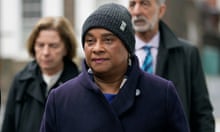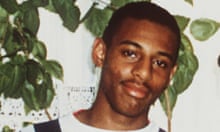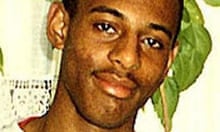Tributes have been paid to Sir William Macpherson, the judge who led the damning inquiry into the police investigation after the 1993 murder of Stephen Lawrence, who has died aged 94.
A captain in the Scots Guards during the second world war, he was also one of Scotland’s longer-serving hereditary clan chiefs, and as a retired high court judge he produced the excoriating Macpherson report after the racially motivated killing of Lawrence in 1993.
The publication of the 350-page report in 1999 has been described as one of the most significant moments in the history of UK criminal justice. It concluded that the investigation by the Metropolitan police had been “marred by a combination of professional incompetence, institutional racism and a failure of leadership”.
Doreen Lawrence, Stephen’s mother, said that while Macpherson’s family would be very saddened by their loss, they should also be incredibly proud of what he had done for her and her family.
Lady Lawrence said initial concerns at Macpherson’s appointment as chair of the inquiry led to a request to then home secretary Jack Straw to replace him. However, she was glad he had remained in place because he had “the decency and integrity to listen carefully to what was overwhelming evidence of racism infecting the investigation into my son’s murder”.
“Despite his background and experience, Sir William, together with his advisers, was able to understand how racism affected both the police and society and provided a framework of how it could be eradicated,” she said.
Lord Simon Woolley, who attended the inquiry as founder of Operation Black Vote, said Macpherson’s report “changed everything”. “For decades, black people knew there was inequality. And yet it took an elderly white judge to dramatically call it out as institutional racism,” he said.
The report led to a storm of criticism, with Macpherson himself subjected to professional and personal denigration. In 2000, he told the Guardian that he was “surprised, disappointed and momentarily angered” by the rightwing backlash to his report. However, 67 of the report’s recommendations led directly to specific changes in practice or law within two years. They included the setting up of the Independent Police Complaints Commission to investigate police actions.
In an interview two years ago, Macpherson downplayed his role in the reforms. He said: “I’m pleased we achieved what we did, which was to give a strong push to people in the right direction. We could do no more than that, of course. Because I couldn’t work miracles about making police behave better or improving the relationships between black and white people.
“There’s obviously more to be done, but my feeling is that great steps have been taken in the right direction.”
Michael Mansfield QC, who represented the Lawrence family at the inquiry, said they initially had doubts that a former army captain and high court judge was the right man for the job. Macpherson listened to their concerns – and soon allayed them.
“I think he was shocked by what he heard. He could not believe that as a man in uniform himself once, that men in uniform could behave in the way that they obviously did,” Mansfield said.
Mansfield QC was impressed with Macpherson’s determination to make lasting change. He said his tenacity meant that after the report was published, he was determined to ensure that the recommendations were not left on the back burner, travelling around the country to ensure they were implemented.
Macpherson enjoyed a long career at the bar before chairing the inquiry. As Sir William Macpherson of Cluny and Blairgowrie, he was known as “Cluny” to his clansfolk, succeeding as chief in 1969 and hardly ever missing the annual clan gathering.
The Clan Macpherson Association said it was fortunate to have benefited from “his guidance, support and leadership” for half a century.
He was reportedly a noted performer during the annual clan gathering, taking the floor at the ceilidh to lead the singing. In 2017, leading his clan at the opening of the Edinburgh International Tattoo, he turned down the invitation to sit in the royal box, saying he wished to “sit among my people”. He is succeeded by his son Jamie, who becomes the 28th chief of Macpherson.
Lord Herman Ouseley became chair of the Commission for Racial Equality in the same week that Lawrence was murdered in 1993. He paid tribute to Macpherson’s ability to listen to the experiences of others.
“He was brave enough to listen, to understand and express himself in such a clear way that led to reform of legislation and led to a very clear understanding of how public institutions, could move forward.”
Lamenting the fact that the UK is still fighting institutional racism decades on from the inquiry, Ouseley said: “And yet the format and prescription are all in the Macpherson report.”
Woolley said a great deal was owed to Macpherson. “I’m sure that he would be saddened that the definition that he proudly proclaimed needed to be confronted is sadly still being denied.”
He described Macpherson’s genius as not only to have labelled the problems within the police force as institutional, but also to have widened it out so the definitions could be applied to all institutions, which surprised even the activists attending the inquiry.
David Lammy, the shadow justice secretary, tweeted: “His seminal report was a watershed moment that unflinchingly raised the spectre of institutional racism in the Met police and across public services. Twenty years on and in the wake of BLM there is much more to do.”
Scotland’s deputy first minister, John Swinney, said: “The challenge, rigour, and humanity of his report was a product of who he was … He did much good locally in Blairgowrie.”
Lady Lawrence said Macpherson’s conclusions remain as relevant today as when they were published in 1999. “I had great aspirations that, in his lifetime, Sir William might have been able to see how his report was able to change policing and society for the better. Unfortunately, he wasn’t able to, as racism continues to affect both the police and society at large.”
Macpherson died peacefully at his home in Perthshire on Sunday, surrounded by his family.








